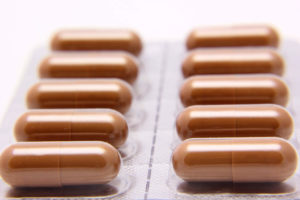A new study, published this week in BMJ, found no major differences in the effectiveness of cognitive behavioral therapy (CBT) and antidepressants. When the researchers compared previous studies, they found no major differences in relapse rates or level of treatment response between those taking antidepressants and those undergoing CBT.
 “The available evidence suggests no difference in treatment effects of second-generation antidepressants and cognitive behavioral therapies, either alone or in combination, in major depressive disorder,” the authors conclude. “Given that patients may have personal preferences for one first line treatment over the other, both treatments should be made accessible, either alone or in combination, to primary care patients with major depressive disorder.”
“The available evidence suggests no difference in treatment effects of second-generation antidepressants and cognitive behavioral therapies, either alone or in combination, in major depressive disorder,” the authors conclude. “Given that patients may have personal preferences for one first line treatment over the other, both treatments should be made accessible, either alone or in combination, to primary care patients with major depressive disorder.”
Researchers estimate that more than 32 million Americans could be diagnosed with major depressive disorder (MDD) and the current standard of care usually involves the prescription of second-generation antidepressant drugs. However, as many as 20% of patients do not fill these prescriptions because of side-effects. While many of these patients have indicated that they would prefer psychotherapy to drugs, these treatments are less readily available.
The authors of a new review of antidepressants and psychotherapy effectiveness for depression, led by Dr. Halle Amick from the University of North Carolina at Chapel Hill, found no difference in the treatment effectiveness of CBT and second generation antidepressants and suggest that psychotherapy should be made more widely available.
They conclude:
“Having access to psychotherapeutic interventions in the primary care setting might improve treatment outcomes for patients with major depressive disorder. It has the potential to improve the use of psychiatric consultations and therapy and to enhance coordination of care between primary care clinicians and mental health professionals. It may also have additional downstream effects of reducing the stigma associated with mental illness, in general, empowering patients to tackle the symptoms and problems associated not only with depression but also with other mental health related concerns and encouraging them to seek and maintain treatment more quickly at an earlier stage of their illness.”
In an accompanying editorial, Mark Sinyor for the University of Toronto points out that these results can be “disappointing” as it reveals “there is such a limited reliable evidence base to evaluate these basic treatments.” “The relative paucity of good comparative evidence is in part because psychotherapy trials are more labour intensive for both patients and researchers,” he adds. “It is also because, in general, no one stands to profit substantially from expensive psychotherapy trials with positive outcomes, in contrast to the financial rewards to pharmaceutical companies that often follow positive trials of new drugs.”
Sinyor advocates for taking meaningful steps toward the development of depression “with the aim of preventing symptoms rather than relying on treatment once symptoms start.”
“These steps should include efforts to correct social antecedents of major depressive disorder such as poverty and lack of education, along with improved mental health curriculums in schools.” In schools, he said, “students could be taught basic CBT or other interventions such as mindfulness.”
*
Amick Halle R, Gartlehner Gerald, Gaynes Bradley N, Forneris Catherine, Asher Gary N, Morgan Laura C et al.Comparative benefits and harms of second-generation antidepressants and cognitive behavioral therapies in initial treatment of major depressive disorder: systematic review and meta-analysis BMJ 2015; 351:h6019 (Full Text)
Sinyor Mark, Fefergrad Mark, ZaretskyAri. Cognitive behavioural therapy or antidepressants for acute depression?BMJ 2015; 351 :h6315 (Full Text)















I always find it disingenuous, at least, when a study like this finds equivalent outcomes and then suggests that both therapy and medication are equally valid approaches. Aren’t we forgetting something important? Namely that therapy doesn’t attack your brain with foreign chemicals or create an array of side effects that vary from annoying to potentially deadly? If both have the same outcomes, and one has much, much lower risks, an honest conclusion should be that PSYCHOTHERAPY MUST BE OFFERED IN ALL CASES before antidepressants are even considered.
Of course, considering Kirsh’s work that suggests most of antidepressants’ effects are placebo effects, this isn’t exactly a ringing endorsement of psychotherapy, either. But at least it’s very unlikely to end your sex drive permanently or induce you to kill yourself or go on a mass shooting spree.
— Steve
Report comment
Instead of “primary care patients with major depressive disorder”, how about “real people with real problems”? How pedantic can you get…
I took a look at the original paper. Several problems spring up right away: most of the 11 comparison studies in the metaanalysis are only following people for 3-6 months. That’s just not long enough for therapy to show many of the benefits that are possible in a good long-term intensive psychotherapy. But it’s easy for drugs to damp down someone’s feelings in that timespan. So having a short-term study series and focusing only on damping down symptoms rather than other functional measures is a source of distortion.
So this idea that you can say, as the title of this article does, “Therapy and Drugs Equal for depression” is meaningless – How long of therapy? How many times per week? How skilled were the therapists? Were the diagnoses valid? (No…) How high a dose of drugs? Etc etc etc etc etc. This type of report is so uninformative and empty. There is no one therapy that can be put out there and compared to drugs. You have to be specific about the frequency, length, and skill of the humans providing the therapy. And the setting.
Nevertheless, therapy was slightly ahead of drugs in benefit in most of the studies ion this metaanalysis (not equal), although the difference was not statistically significant (another problem is that statistical significance is based on an arbitrary line based on the 95th percentile; why it should be that percentile who knows. A better measure would be effect size).
Furthermore, therapy is not one standard thing that comes off and assembly line like a pill and is shoved down people’s throats. Different therapists have different skills and approaches and different people prefer different types or lengths of therapy. So this whole comparison is kind of bizarre. Nevertheless I’m pretty confident that if you followed people on drugs and in whatever kind of therapy for 2-5 years, the benefits of therapy would get greater and greater compared to drugs over time. There are long-term studies like the Helsinki Psychotherapy Study and the Leichsenring metaanalysis and some of Barry Duncan’s work in The Heart and Soul of Change, studying long term therapy over 2-5 years, and people do tend to benefit more and more from it over time.
And yes this study did assert with no evidence whatsoever that antidepressants were very effective for moderately depressed people, whereas Kirsch’s and others’ work has argued strongly against that. Then again if the authors didn’t misrepresent what’s known that it probably wouldn’t get published.
Report comment
I was also wondering that. A lot of damage can happen long-term (over several years) for individuals in the antidepressant group. This can happen because drugs can interfere with normal metabolic activities of the brain. Additionally, having a label for the disorders can also affect the individuals directly (in this case, the patients being told that they have “major depressive disorder” / MDD – based on doctor’s subjective evaluations; without any objective tests). Since these labels have a “permanent” feel to them, the label itself can cause a great deal of mental pain to the patient, increasing his/her mental proliferation, worry, anxiety, etc., triggering epigenetic changes and adverse changes in the brain over time (neuroplasticity).
Report comment
This is correct. Often therapy makes people a little worse at first in some ways; i.e. it uncovers difficult feelings and forces people to make changes. But in the long term the research above tends to show that people get better and better, on average, in long term therapy. With drugs on the other hand, outcomes tend to get worse the longer you stay on them…. worse side effects, stronger identifications as mentally ill, brain getting more dependent on the artificial state created by the drug.
Psychiatrists have a good reason not to do long-term 2-5 year studies of drugs vs therapy – therapy would probably blow the drugs out of the water and that would in turn threaten the legitimacy of the rampant overuse of drugs for every problem that currently infects their profession.
I have to back myself and say again that the criticisms of this study – that therapy varies depending on frequency, length, skill of therapist, setting – in complex ways that a pill off the assembly line does not – call it into real question and expose it as unreliable, since there is no one “psychotherapy” to compare drugs to. In other words the essentialism, reductionistic, concretism, reifying nature of psychiatric research is almost endless.
Report comment
Therefore, CBT or other types of psychotherapy are clearly far superior to drug treatment which comes with cumulative and damaging side effects. In many cases, therapy is even a less costly treatment. Regardless, the harm inflicted by the neurological side effects of antidepressants should pretty much rule them out as a viable treatment option at this point, given that psychotherapy works just as well with no side effects.
Report comment
This is correct. Drugs should be largely abandoned as a more risky more frequently harmful “treatment.” And, longer term side by side comparisons of psychotherapy against drugs are needed to expose how weak and harmful of a treatment drugs really are.
Report comment
I do agree with all the former comments, and just want to remind humanity of today’s psychiatric and mainstream medical industries’ hobby of massively misdiagnosing the adverse effects of the antidepressant drugs as “bipolar,” especially in children. And that this completely iatrogenic pathway to a “bipolar” diagnosis, is now considered a completely acceptable diagnosis in the DSM5, by those also still trying to claim “bipolar” is a genetic illness.
And, unfortunately, today’s recommended “bipolar” drugs – the antipsychotics mixed with the antidepressants, etc. – are medically known to cause anticholinergic intoxication syndrome. The central symptoms of which are medically indistinguishable from the positive symptoms of “schizophrenia:”
“Central symptoms [of anticholinergic intoxication syndrome] may include memory loss, disorientation, incoherence, hallucinations, psychosis, delirium, hyperactivity, twitching or jerking movements, stereotypy, and seizures.”
“Substances that may cause this toxidrome include the four ‘ant'”s of antihistamines, antipsychotics, antidepressants, and antiparkinsonian drugs[3] as well as atropine, benztropine, datura, and scopolamine.”
Gosh, and the psychiatrists can’t figure out why they’re seeing such bad outcomes in “bipolar” patients today. No doubt, it’s because combining the antidepressants and antipsychotics is medically known to cause psychosis via anticholinergic toxidrome.
And one does wonder how long the psychiatric establishment will take to change their current treatment recommendations for “bipolar,” given this information. So I recommended such a change to the Mayo Clinic recently. We’ll see how long, or if they ever change their “bipolar” treatment recommendations, that I’ve pointed out to them are known to medically cause psychosis, and the other positive symptoms of “schizophrenia,” via anticholinergic toxidrome.
“If both have the same outcomes, and one has much, much lower risks, an honest conclusion should be that PSYCHOTHERAPY MUST BE OFFERED IN ALL CASES before antidepressants are even considered.” True, unless the psychologist also believes in the scientifically invalid DSM disorders, and wants to cover up the adverse effects of the psychiatric “wonder drugs,” too. As many US psychologists do seem to want to do today.
Trust me, I pointed out major drug interactions given to a child, that a psychologist friend and I were volunteering to help, and she tried to deny these. It’s pathetic how much the medical industry colludes to protect their delusional theories, at the actual cost of harming children.
Report comment
“no major differences in relapse rates or level of treatment response between those taking antidepressants and those undergoing CBT.” I find this hard to believe. Irving Kirsch has already shown that antidepressants are no more effective than a placebo. Plus there are the numerous side effects, including increased suicidal and homicidal ideation aswell as the long term neurological damage. It is also known that psychiatric drugs (especially antipsychotics, but I’m fairly sure antidepressants are included) increase the rate of relapse.
Psychiatric drugs are not safe and effective as is commonly claimed by psychiatry and the drug industry. What little evidence there is of symptom improvement (these ‘symptoms’ are frequently emotions, behaviours, or personality traits, and not symptoms of any real disease) is just that, improving symptoms , not improving quality of life or fixing the problem. Numbing someone so they no longer feel sadness (or anything) is not a ‘cure’ and does not fix the problem, though on paper it looks good due to ‘symptom improvement’ which is more a manipulation than science. Psychiatric drugs cause far more harm than good.
Although I’m fairly anti-drug (anti-psychiatric-drug), I do feel there is a place for psychiatric drugs, however that would be in maybe 5% of cases instead of the 50-75%+ of current cases, and they would only be used sparingly for a limited time and as a last resort. Though honestly I’d be just as happy to see psychiatric drugs exposed for the toxic and harmful substances they are and completely abolished, just like psychiatry.
Report comment
A note of measured dissent on several points:
(1) Diagnosis rates on Major Depressive Disorder are vastly inflated by drug company hype. See “Psychiatry Under the Influence — Institutional Corruption, Social Harms, and Prescriptions for Reform” by Robert Whitaker and Lisa Cosgrove.
(2) While trials of psychotherapy are generally expensive, this might not be their most disabling aspect. Those who conduct them have a long term financial incentive to read patient outcomes in the most positive light, promoting acceptance of their practices of therapy. Likewise, the majority of these studies do not replicate when attempted by other than the original investigators.
(3) When investigators say that psychiatric drugs are no more effective than CBT, they are omitting the comparison of both with outcomes of placebo. If psychiatric drugs are no more effective than placebo, then the clear implication is that CBT is likewise.
(4) It’s been known since the 1950s from studies of Freudian and Adlerian therapy conducted at in-patient facilities serving moderately to severely depressed patients, that neither is more effective over periods of six months than simply placing the patient on a waiting list. About 50% of both the treated and untreated groups will report “improvement” after six months. Multiple studies are reported in Martin L. Gross’ “The Psychological Society — the impact and the failure of psychiatry, psychotherapy, psychoanalysis and the psychological revolution.”
(5) The notion that psychotherapy can “force” a patient to confront past painful experiences is fundamentally an oxymoron of both process and ethics. If trauma is created by coercion and abuse, then how may it be healed by “forcing” the patient to do anything? This idea may also be contradicted by large numbers of patients who remain in therapy for years without gaining independence or moving on. This sense of “stuck-ness” was very much exploited by Big Pharma in its propaganda for medicalizing the treatment of emotional trauma in the 1970s. But the phenomenon itself was real and widely observed.
Overall, I think it would be fair to suggest that both psychiatry and psychology have thus far failed to demonstrate reliable benefits to the people they are intended to serve.
Report comment
As I noted to you in another thread, long term psychotherapy metaanalyses by Falk Leichsenring, Paul Knekt, and Barry Duncan show that people attending psychotherapy long term (between 1-3 years) are usually much better off on a range of functional and symptomatic outcome measures than people who don’t receive therapy. Put another way, 75-80% of people are functionally and symptomatically better off with psychotherapy than without, according to several recent studies that Duncan integrated in The Heart and Soul of Change.
Here are several references below. The Leichsenring metaanalysis in particular covers over 20 studies of over 1,000 people, so is more convincing than citing of a few old inpatient studies from the 70s. These newer studies make a strong case that long-term therapy can offer reliable benefits to the people it serves, contrary to your message. As to the point that it is expensive, that is correct, but on the other hand, it can lead to cost savings over longer periods of time.
http://jama.jamanetwork.com/article.aspx?articleid=1028649
http://www.ncbi.nlm.nih.gov/pubmed/18005493
http://www.amazon.com/The-Heart-Soul-Change-Delivering/dp/1433807092
In other words I want to encourage other readers that there is good reason to believe that intensive psychotherapy does tend to give reliable benefit, based on actual data from recent studies. Where it’s possible to access it, psychotherapy is a much better bet than long term use of drugs.
Report comment